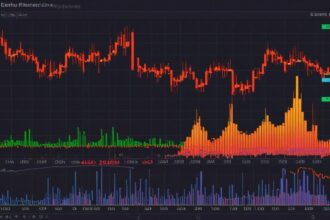Significant advancements in AI are transforming the telecommunications sector, with Microsoft leading the way in enhancing customer experiences and operational efficiencies ahead of MWC 2025.
The telecommunications industry is currently witnessing substantial advancements in artificial intelligence (AI) as it emerges as a primary sector for the adoption of generative and agentic AI technologies. A recently released white paper by IDC highlights that telecom and media companies are seeing nearly four times the return on investment (ROI) for each dollar spent on AI initiatives. This trend is expected to continue, with projections indicating that by 2027, almost 90% of telecom providers will utilise generative AI to enhance customer experiences, a notable increase from 62% seen today.
In light of these advancements, 96% of tier-1 telecom customers are reported to be adopting Microsoft’s AI solutions. A broad ecosystem of customers and partners is tapping into AI’s potential to transform customer experiences, modernise networks, streamline business operations, and drive growth.
As the industry gears up for the Mobile World Congress 2025 (MWC), Microsoft has announced new capabilities and customer developments that reflect how telecom firms are integrating Microsoft Cloud and AI functionalities to support their AI transformation journey. Attendees at MWC can expect to see live demonstrations and attend informative sessions that showcase how Microsoft AI is reshaping the telecom landscape.
Central to this transformation is the Telco industry data model, part of Microsoft Fabric. This model aims to provide a unified platform for telecom firms to manage and analyse vast amounts of data, enhancing their ability to derive actionable insight from the complex, data-rich environments inherent in telecom networks. The model allows for integrated analytics across network performance metrics and customer interactions, facilitating operational efficiencies and quicker time-to-market for services.
More than half of telecom customers are leveraging Microsoft Fabric for real-time insights to optimise their operations. Major players such as Telefónica, KPN, and One NZ are already seeing significant results, while over 19,000 customers in total, including 70% of Fortune 500 companies, are using Microsoft Fabric.
In an example of successful implementation, Balakrishna D.R., Executive Vice President at Infosys Limited, stated, “Microsoft Fabric, powered by Telco data model and AI capabilities, has revolutionized our solutions by providing real-time insights throughout the customer journey, potentially increasing operational efficiency by 40%.”
Global telecoms are increasingly utilising AI and cloud technologies to innovate and enhance their operations. Collaborations with prominent telecoms such as KT Corporation, Lumen, Telstra, and Vodafone exemplify how companies are innovating to improve customer experiences and streamline operations. Spark, New Zealand’s leading telecom provider, is engaging in one of the country’s largest public cloud partnerships with Microsoft, migrating workloads to Microsoft Azure and implementing Microsoft 365 Copilot.
Additionally, Microsoft has reported a strategic collaboration extension with Telefónica to co-develop digital solutions, which includes leveraging the Open Gateway initiative aimed at transforming telecom networks.
As firms integrate Microsoft solutions, significant improvements in business operations are noted. For instance, AT&T has introduced automation for code conversions and HR inquiries, boosting employee experience and customer service while reducing costs.
Insights from the IDC white paper also indicate a strong focus on AI-powered customer engagement among telecom companies. A substantial number are currently using AI for marketing and customer service, with notable examples of successful AI applications from companies like Telkomsel and Vodafone, both utilising Microsoft technologies.
As the sector moves forward, there is anticipation surrounding Microsoft’s announcement of the Telco industry data model within Microsoft Fabric, set to launch in April 2025, which is designed to enhance this data management for telecom firms.
The AI-driven telecom landscape continues to evolve, with new revenue opportunities emerging through innovative collaboration and robust infrastructure that integrates real-time data and customer support systems. As the industry progresses, many telecoms are focused on harnessing advanced AI capabilities to achieve operational excellence and improved customer satisfaction.
To explore these developments further, Microsoft has invited attendees to engage at the upcoming Mobile World Congress 2025, where new AI innovations and enhanced capabilities will be showcased.
Source: Noah Wire Services
- https://www.microsoft.com/en-us/industry/blog/telecommunications/2025/02/27/microsoft-ai-ignites-telecom-innovation-and-growth/ – This article supports the claim that the telecommunications industry is adopting AI technologies, with 96% of tier-1 telecom customers using Microsoft AI solutions. It also highlights the upcoming Telco industry data model in Microsoft Fabric and the significant ROI seen by telecom companies investing in AI.
- https://www2.deloitte.com/us/en/insights/industry/technology/technology-media-telecom-outlooks/telecommunications-industry-outlook-2025.html – This Deloitte report corroborates the growth and integration of AI in the telecommunications sector, emphasizing the potential for telcos to remain relevant in the connectivity space amidst advancements in generative AI.
- https://www.microsoft.com/en-us/industry/blog/telecommunications/2025/02/27/microsoft-ai-ignites-telecom-innovation-and-growth/ – The article discusses how major telecom companies like Telkomsel and Vodafone are using Microsoft AI technologies to enhance customer experiences and streamline operations.
- https://www2.deloitte.com/us/en/insights/industry/technology/technology-media-telecom-outlooks/telecommunications-industry-outlook-2025.html – This report highlights the future of telecommunications, including the integration of AI and cloud technologies to drive innovation and operational efficiency.
- https://www.microsoft.com/en-us/industry/blog/telecommunications/2025/02/27/microsoft-ai-ignites-telecom-innovation-and-growth/ – It mentions the upcoming Mobile World Congress 2025, where Microsoft will showcase new AI innovations and capabilities in the telecom sector.
Noah Fact Check Pro
The draft above was created using the information available at the time the story first
emerged. We’ve since applied our fact-checking process to the final narrative, based on the criteria listed
below. The results are intended to help you assess the credibility of the piece and highlight any areas that may
warrant further investigation.
Freshness check
Score:
8
Notes:
The narrative references upcoming events like the Mobile World Congress 2025 and future projections, indicating recent content. However, specific details about the IDC white paper’s release date are not provided.
Quotes check
Score:
5
Notes:
The quote from Balakrishna D.R. does not have an easily verifiable original source online. It may be original to this context or not widely reported elsewhere.
Source reliability
Score:
6
Notes:
The narrative originates from a news aggregator and lacks a specific, well-known publication source. It references reputable companies and initiatives but does not provide direct links to original sources.
Plausability check
Score:
9
Notes:
The claims about AI adoption in the telecom industry and Microsoft’s involvement are plausible given current trends in technology and business. The narrative aligns with expected developments in AI integration.
Overall assessment
Verdict (FAIL, OPEN, PASS): OPEN
Confidence (LOW, MEDIUM, HIGH): MEDIUM
Summary:
The narrative appears to be relatively fresh and plausible, aligning with current trends in AI and telecom. However, the lack of specific source attribution and unverified quotes reduce confidence in its accuracy.













